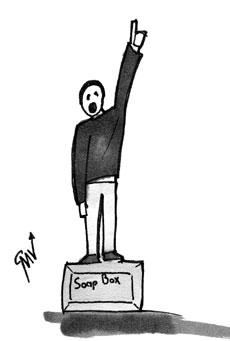Opinion: Child prodigies are people too

Matt Vroom
Sep 24, 2004
As a child who prided himself on being more intelligent than his classmates, few things bruised my ego more than news segments on child prodigies. I recall a 60 Minutes report on an 11 year old with an IQ of 170. He was getting a bachelor’s degree at the time and enjoyed giving pretentious lectures on hunger in Africa. He said his goals were to be an astronaut, president, Nobel laureate.
I took comfort that the chances he will achieve any of his lofty goals are small. The chances he will achieve all of them are infinitesimal. Still, he believed he could do it. The Greeks called such presumption “hubris.” Kings with hubris were destined for marriage to their mothers, self-inflicted blindness and exile. Since antiquity, these stories have reassured us that shortcomings are part of what it means to be human.
The burned -out child star is a well-known target of ridicule in popular culture. William H. Macy played a former wiz kid in Magnolia who attempts to rob a retail store to pay for braces. Philip Seymore Hoffman plays an ex-child star that hires people to pretend to film his own life story in the film Along Came Polly. There are many more examples.
The theme seems to be that former child stars never lead well-balanced adult lives. They have problems facing people who no longer appreciate them. Some people even want them to fail. Child stars are prone to lose all their money from a multi-million dollar heroin addiction, develop a mental disorder and end up in jail somewhere.
People are eager to make ex-child-stars the targets of derision. It’s not nice, but understandable.
Get The Daily Illini in your inbox!
Many child stars weren’t so outstanding in the first place. These children developed and peaked early, getting an advantage on children their age. Still, the children rarely perform at the level of adult professionals.
People appreciate child geniuses more for their novelty than their intellectual ability. How many people went to the above-mentioned 11-year-old boy’s lectures for the solution to world hunger, versus those who went with the purpose of seeing the cute little boy use big words? Would 60 Minutes care if a 40-year-old economist gave the same speech?
Similarly, children cannot possibility understand emotions and the dynamics of social interaction well enough to be great actors. People appreciate child-stars only for their cuteness. There is no guarantee they will grow to be attractive adults.
Eventually, normal people catch up to the young standouts who peaked early. They become nothing more than one of many talented individuals. In a classic study that tracked the lives of 1,500 child prodigies, none of them went on to win a Nobel prize. Two intelligent students who did not meet the criteria of “child prodigy” at the time of the experiment, however, would go on to achieve that honor.
The result is that the same people who once adored these child prodigies become indifferent to them. Oftentimes, these people will even detest the ex-child-star for achieving fame with marginal talent (compared to other adults). This flip-flop damages the psyche of the ex-child star.
Police recently arrested Edward Furlong and Macauley Culkin. Furlong, of Terminator 2, attempted to free lobsters from a supermarket while heavily intoxicated. Culkin, of Home Alone, had a controlled dangerous substance without a valid prescription and marijuana in his car.
To be fair, not all ex-child stars become unscrupulous drug addicts. Some do go on to be well-balanced adults after they pass their peak of celebrity. “Contrary to popular belief, I’ve never been to rehab,” Culkin said.
The conventional trend is for parents to push their children to grow up quicker by replacing playtime with music lessons, soccer practice and private tutors. But if being a childhood success has little correlation to adult success, what’s the point of ruining childhood?
Alan Xiang is a sophomore in engineering. His column runs alternate Fridays. He can be reached at [email protected].





